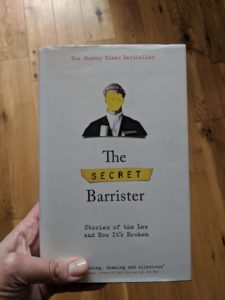The Secret Barrister by Anonymous
Written by Ashley Kelmore, Posted in Reviews
Four Stars
Best for:
Anyone interested in the English criminal justice system.
In a nutshell:
An actively practicing barrister shares what goes on in the English justice system, and offers suggestions of ways to fix it.
Worth quoting:
“Early guilty please equal cheap guilty please. It does not follow, of course, that early guilty please equal correct guilty please.”
“Defense legal aid, and the effective adversarialism that it permits, doesn’t simply protect the defendant; it protects the public by keeping the prosecution, and the court system, honest.”
“In many respects, the released innocent is worse off than the released convict, the latter of whom will at least have a measure of institutional assistance with their reintegration.”
Why I chose it:
I’ve seen this book prominently displayed in nearly every bookshop I’ve visited. I’ve enjoyed similar books related to the healthcare field, and thought this might be an interesting switch.
Review:
I know very little about the England / Wales justice system (which is not the same as the Scottish justice system or the Norther Ireland justice system). I’ve seen Mark Darcy defend Pussy Riot dopplegangers in British Jones’s Baby, and I watched a few episodes of that show where Gillian Anderson was a detective and the guy from 50 Shades of Grey kept killing people. But as someone born and raised in the US, there is a huge blank space where any knowledge of English justice might be.
Given that, this book was a fantastic was to fill in that space. Less ‘here’s an interesting story from my day as a barrister’ (which, side note, I finally kind of understand the difference between a barrister and a solicitor!) and more ‘let’s walk through the trial system from start to finish,’ this book is an examination of how the English adult criminal justice system is meant to work, how it works in reality, and what should be different. It is written by an anonymous — though active — barrister, who I suspect is a man (more on this in a moment) but who is dedicated to exposing how the system fails pretty much everyone, including the accused and the complainants.
The overarching theme of this book is that it is in EVERYONE’S best interest to have a well-functioning criminal justice system that protects the rights of the accused and looks after victims in an honest way. Areas I found especially interesting — and that might run counter to what some people think — were the ones that looked at the dangers of putting victims first in the way England currently does. One question that comes up a lot is — if you were falsely accused of a crime, what protections would you want in place to ensure you were treated fairly? The Barrister’s argument is that this is where we should focus, because, as most people agree, if we need to balance the two, it is better for society if someone is wrongly freed than wrongly imprisoned.
The book is laid out as the progression of a criminal case, although it doesn’t follow just one all the way through. The first chapter introduces the players, which, again, is extremely helpful to those of us not from here. (Seriously, I feel like they should issue a copy of this book with each residency visa.) From there, they cover charges, bail, prosecution (including the lack of sufficient funding), the problems with current Victim First thinking, legal aid / paying for defense, a look at the adversarial vs. inquisitorial systems, sentencing, and appeals. It’s exhaustive but not exhausting (unless you count how exhausting it is that funds keep getting cut because elected officials don’t fully grasp the issues).
My one big complaint is that two of the cases the author chose to illustrate things are sexual assault, and I think they were the wrong choices. One was an example of someone who was probably guilty not being convicted, and that one wasn’t as problematic. However, that was then followed by the use of a false accusation of sexual assault to illustrate a deep miscarriage of justice. The author swears up and down that they fully understand how rare such false allegations are, and that the more likely scenario is someone who is guilty not even being charged. But they still chose this instead any of the hundreds and thousands of other crimes that have horrible incorrect convictions. This is what makes me think the author is a man; I don’t think a woman would have been so cavalier in her choice of example.
Setting that frustration aside, I think this book is well worth a read, and one I will be recommending to all my friends who are new to the UK or are just interested in better understanding the UK criminal justice failures.
Keep it / Pass to a Friend / Donate it / Toss it:
Keep it.

